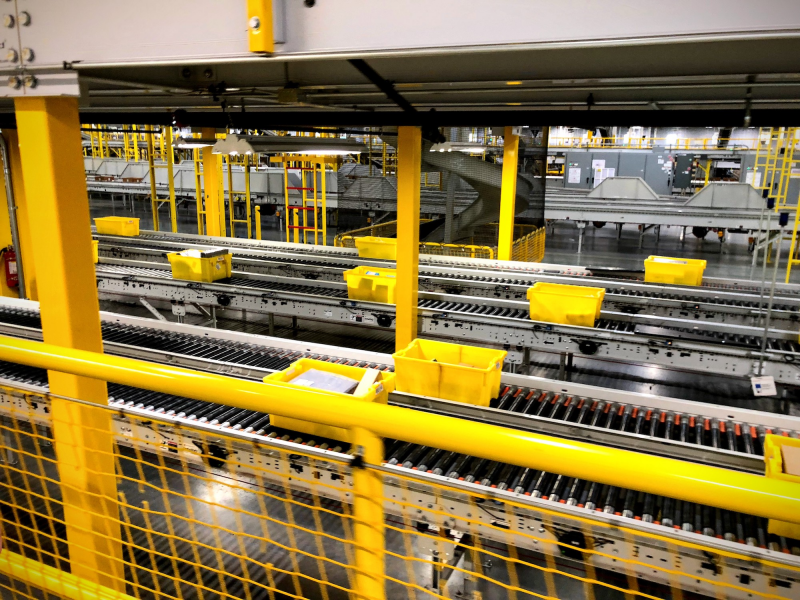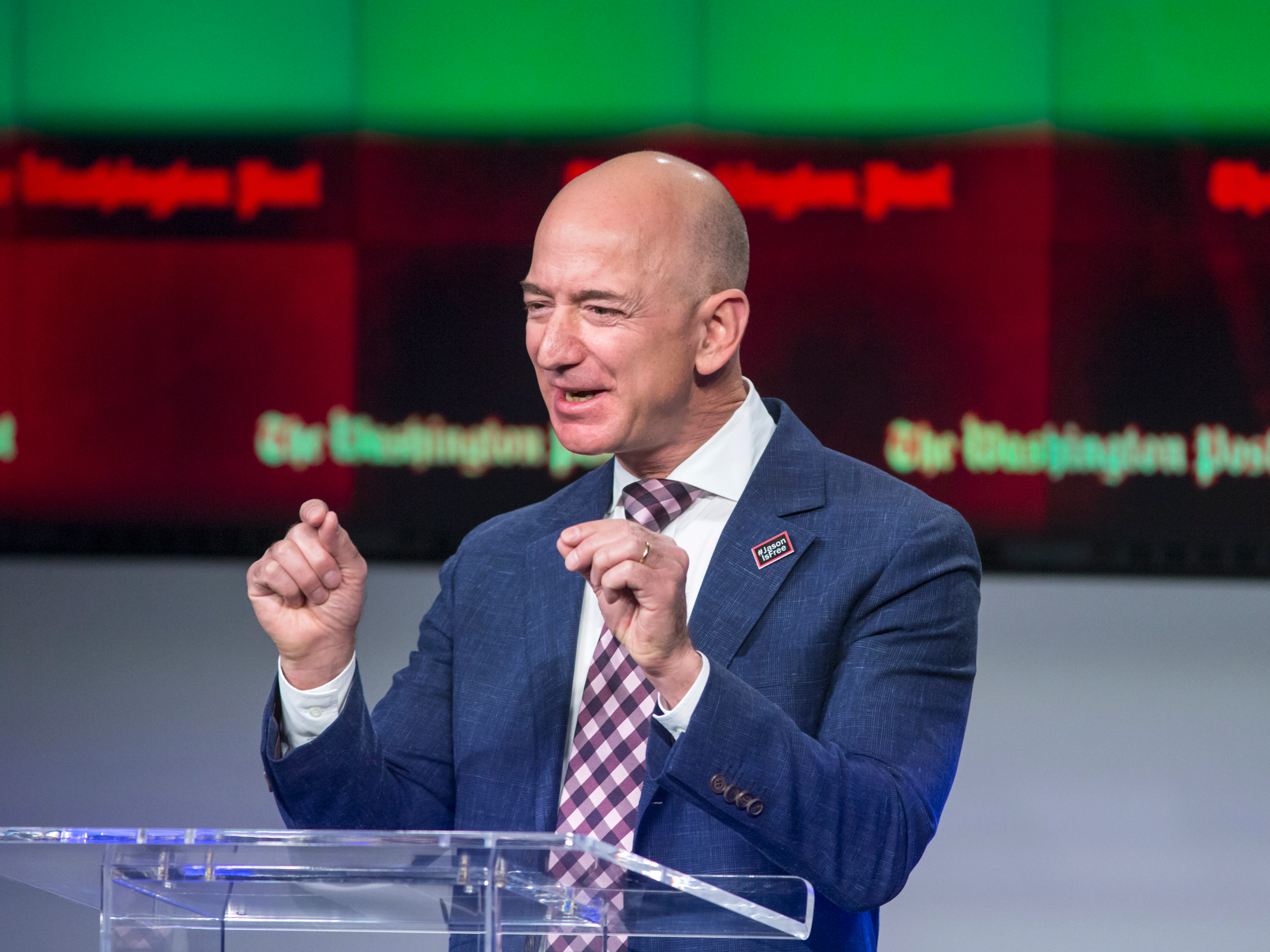- More than 4,520 Amazon employees signed an open letter to Jeff Bezos demanding the company get serious about climate change.
- The letter comes days after a Gizmodo report revealed how aggressively Amazon is courting oil and gas companies.
- The signatories made a series of demands, ranging from an emissions-cutting timeline, to a demand for fair treatment of employees during extreme weather events.
- Visit BusinessInsider.com for more stories.
More than 4,500 Amazon employees published an open letter to Jeff Bezos on Wednesday demanding the company do more to address climate change, saying leadership is “urgently needed.”
“We believe this is a historic opportunity for Amazon to stand with employees and signal to the world that we’re ready to be a climate leader,” the letter reads. The signatories include a huge range of Amazon employees including engineers, warehouse workers, and salespeople.
The letter picks apart five elements of Amazon’s sustainability policy which employees finds lacking:
1. Amazon is being too vague
The letter says Amazon hasn't been transparent about its plans to attain 100% renewable energy. It points out that a target date hasn't been given for this goal. Moreover, it says that given the company's ever-expanding growth, a commitment to net-zero shipments could still mean it's polluting more in 10 years' time than it is today.
2. The concept of "shipment zero" is broken
The signatories take issue with the company's commitment to "shipment zero," i.e. completely offsetting the carbon emissions generated by Amazon deliveries. The signatories write that offsetting emissions is not synonymous with ceasing to be a polluter, pointing to the fact that Amazon recently purchased 20,000 new diesel vans.

"Offsets can entail forest management policies that displace Indigenous communities, and they do nothing to reduce our diesel pollution which disproportionately harms communities of color," it says.
3. Amazon is getting into bed with big oil
The letter criticises Amazon's relationship with oil and gas companies. "To avert catastrophic warming, the science is clear: we must keep fossil fuels in the ground," it says.
The open letter comes after a Gizmodo report published Monday on Amazon's avid courting of the oil and gas industries. The report also details how Amazon's plans to switch to 100% renewable energy have plateaued, saying that the company's clean energy plans have "stalled out" over the past two years.
4. Amazon donates to politicians who oppose climate legislation
According to the letter, while Amazon has backed some organisations focussed on sustainability, it also donated to 68 members of Congress in 2018 who voted against climate legislation "100% of the time."
5. Amazon's renewable energy efforts lack context
The letter implies that some of Amazon's publicly touted efforts to increase its renewable energy sources aren't as flashy as they appear. As an example, the letter picks up on Amazon's commitment to build at least 50 solar installations for its warehouses by 2020.
"This represents only 6% of buildings in our global fulfillment network and a fraction of our overall carbon footprint," the letter says.

This isn't the first time Amazon has been criticised for paying lip service to green energy. In a February 2019 report, Greenpeace slammed the company for not living up to its promises. The report took issue with how Amazon was powering its Amazon Web Services (AWS) cloud data centres.
"Despite Amazon's public commitment to renewable energy, the world's largest cloud computing company is hoping no one will notice that it's still powering its corner of the internet with dirty energy," Greenpeace USA Senior Corporate Campaigner Elizabeth Jardim said in a statement at the time.
The demands from Amazon employees
The letter ends with a series of demands, some more specific than others.
It says Amazon should commit to cutting emissions by 50% by 2030 and 100% by 2050, and that the company move away from fossil fuels entirely instead of relying on "offsets."
It also demands that the company prioritise its emission reductions in "black, Indigenous, and other communities of color," which are disproportionately affected by pollution.
Amazon employees want the company to refrain from targeting the oil and gas industry for business, and that it stop donating to politicians who "delay action on climate change."
Finally, the letter makes a call for employees' rights, demanding fair treatment for staff during extreme weather conditions. "Unsafe or inaccessible workplaces should not be a reason to withhold pay, terminate, or otherwise penalize employees - including hourly and contract workers," it says.
In response to the open letter, an Amazon spokesman told Business Insider:
"Earlier this year, we announced that we will share our company-wide carbon footprint, along with related goals and programs. We also announced Shipment Zero, our vision to make all Amazon shipments net zero carbon, with 50% of all shipments net zero by 2030. Amazon's sustainability team is using a science-based approach to develop data and strategies to ensure a rigorous approach to our sustainability work. We have launched several major and impactful programs and are working hard to integrate this approach fully across Amazon.
"Our dedication to ensuring that our customers understand how we are addressing environmental issues has been unwavering - we look forward to launching more work and sharing more this year. We have a long history of commitment to sustainability through innovative programs such as Frustration Free Packaging, Ship in Own Container, our network of solar and wind farms, solar on our fulfillment center rooftops, investments in the circular economy with the Closed Loop Fund, and numerous other initiatives happening every day by teams across Amazon. In operations alone, we have over 200 scientists, engineers, and product designers dedicated exclusively to inventing new ways to leverage our scale for the good of customers and the planet. We have a long term commitment to powering our global infrastructure using 100% renewable energy."

